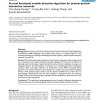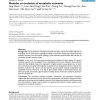141
click to vote
IJBRA
2008
15 years 2 months ago
2008
: Identifying functional modules is believed to reveal most cellular processes. There have been many computational approaches to investigate the underlying biological structures [2...
137
click to vote
ALMOB
2006
15 years 2 months ago
2006
Background: The sparse connectivity of protein-protein interaction data sets makes identification of functional modules challenging. The purpose of this study is to critically eva...
139
click to vote
BMCBI
2007
15 years 2 months ago
2007
Background: Nowadays modern biology aims at unravelling the strands of complex biological structures such as the protein-protein interaction (PPI) networks. A key concept in the o...
114
click to vote
BMCBI
2007
15 years 2 months ago
2007
Background: The architecture of biological networks has been reported to exhibit high level of modularity, and to some extent, topological modules of networks overlap with known f...
144
click to vote
BMCBI
2010
15 years 2 months ago
2010
Background: Many research results show that the biological systems are composed of functional modules. Members in the same module usually have common functions. This is useful inf...
104
click to vote
BMCBI
2010
15 years 2 months ago
2010
Background: Protein-protein interactions play a key role in biological processes of proteins within a cell. Recent high-throughput techniques have generated protein-protein intera...
132
click to vote
BIRD
2008
Springer
15 years 4 months ago
2008
Springer
Abstract. Protein-Protein Interaction (PPI) networks contain valuable information for the isolation of groups of proteins that participate in the same biological function. Many pro...
ITC
2000
IEEE
15 years 5 months ago
2000
IEEE
1 The term "functional BIST" describes a test method to control functional modules so that they generate a deterministic test set, which targets structural faults within ...
118
click to vote
COMPLIFE
2005
Springer
15 years 7 months ago
2005
Springer
Abstract. We describe an approach to clustering the yeast protein-protein interaction network in order to identify functional modules, groups of proteins forming multi-protein comp...



